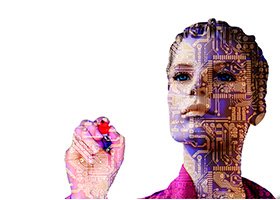
All iLive content is medically reviewed or fact checked to ensure as much factual accuracy as possible.
We have strict sourcing guidelines and only link to reputable media sites, academic research institutions and, whenever possible, medically peer reviewed studies. Note that the numbers in parentheses ([1], [2], etc.) are clickable links to these studies.
If you feel that any of our content is inaccurate, out-of-date, or otherwise questionable, please select it and press Ctrl + Enter.
Artificial intelligence is able to recognize depression
Medical expert of the article
Last reviewed: 02.07.2025
 ">
">Why is depression so difficult to recognize, especially in its early stages? Are there methods to optimize diagnosis? These are the questions scientists have asked themselves.
Before diagnosing depression, a medical professional must do a difficult job: collect all possible data about the patient, present a complete picture of the pathology, analyze the characteristics of personality formation and the person's lifestyle, track any possible symptoms, and find out the reasons that could indirectly affect the development of the disease. Scientists representing the Massachusetts Institute of Technology have designed a model that can determine depression in a person without asking specific test questions, based only on conversational characteristics and written style.
As one of the leaders of the research project, Tuki Alhanai, explains, the first “alarm bell” about the presence of depression can sound precisely during a conversation with a patient, regardless of the person’s emotional state at that moment. In order to expand the diagnostic model, it is necessary to minimize the number of restrictions applied to the information: it is only necessary to conduct an ordinary conversation, allowing the model to assess the patient’s condition during a natural conversation.
The researchers called the model they created “context-free” because there were no restrictions on the questions asked or the answers heard. Using a sequential modeling technique, the researchers fed the model text and audio versions of conversations with patients with and without depressive disorders. As the sequences accumulated, patterns emerged – for example, the standard inclusion of words like “sad,” “fall,” and monotonous auditory signals in conversation.
“The model recognizes the verbal sequence and evaluates the learned patterns as the most likely factors present in patients with and without depression,” explains Professor Alhanai. “Then, if the AI notices similar sequences in subsequent patients, it can diagnose them as having depression.”
Test trials demonstrated successful diagnosis of depression by the model in 77% of cases. This is the best result recorded among all previously tested models that "worked" with clearly structured tests and questionnaires.
Do experts intend to use artificial intelligence in practice? Will it be included in the base of subsequent models of "smart" assistants? Scientists have not yet expressed their opinion on this matter.
Information about the study is published on the Massachusetts Institute of Technology website. It can also be found in detail on the pages http://groups.csail.mit.edu/sls/publications/2018/Alhanai_Interspeech-2018.pdf
 [ 1 ]
[ 1 ]

